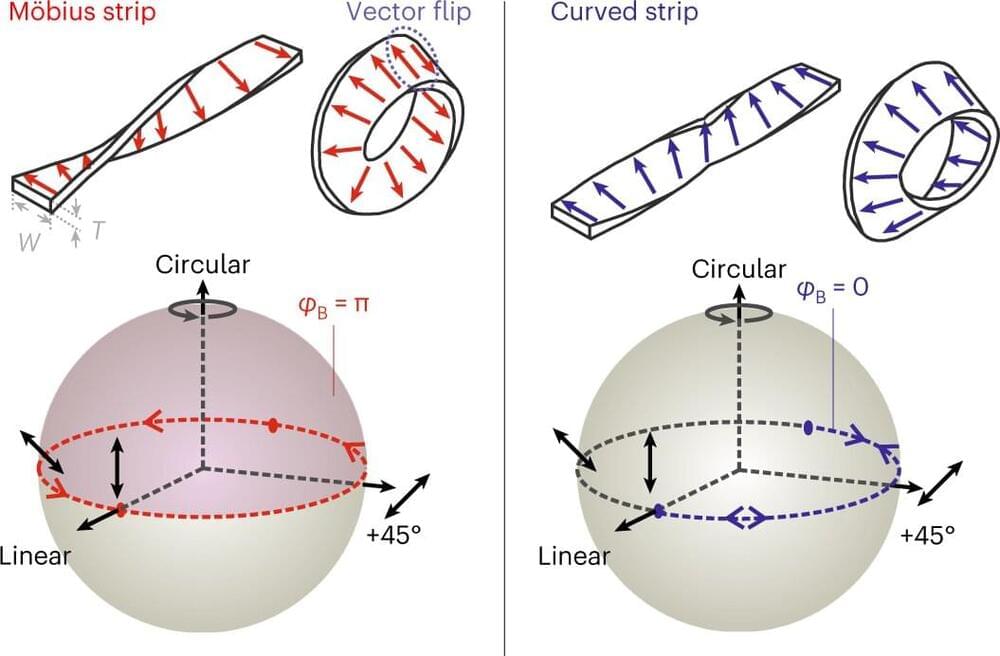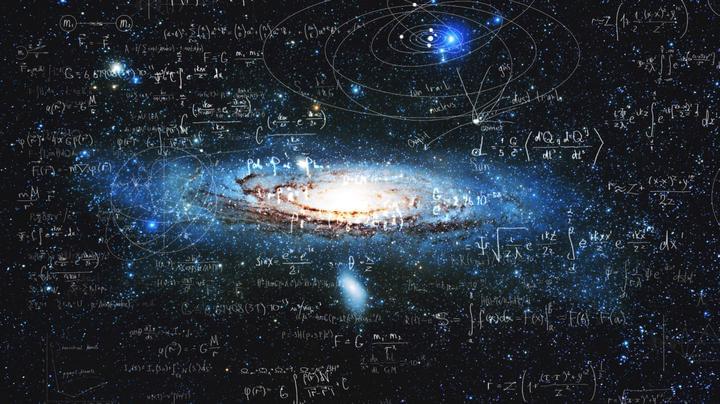We may think we invented mathematics but we actually only discover it. It’s the immaterial underpinning of material nature.
Category: mathematics – Page 120

Insights into optical resonances determined by the topology of the Möbius strip
In the current issue of Nature Photonics, Prof. Dr. Oliver G. Schmidt, Dr. Libo Ma and partners present a strategy for observing and manipulating the optical Berry phase in Möbius ring microcavities. In their research paper, they discuss how an optical Berry phase can be generated and measured in dielectric Möbius rings. Furthermore, they present the first experimental proof of the existence of a variable Berry phase for linearly or elliptically polarized resonant light.
A Möbius strip is a fascinating object. You can easily create a Möbius strip when twisting the two ends of a strip of paper by 180 degrees and connecting them together. Upon closer inspection, you realize that this ribbon has only one surface that cannot be distinguished between inside and outside or below and above. Because of this special topological property, the Möbius strip has become an object of countless mathematical discourses, artistic representations and practical applications, for example, in paintings by M.C. Escher, as a wedding ring, or as a drive belt to wear both sides of the belt equally.

Time travel that cannot alter the past or future ‘proven to be real’
A researcher has claimed time travel may actually be possible – and says he has the math to prove it. Time travel is a concept that has fascinated scientists for some time. It’s the idea that one can move to specific points in time, often seen in popular TV shows and films such as Donnie Darko, Back to the Future andNetflix’s The Umbrella Academy.
How many dimensions are there, and what do they do to reality?
Yet the notion that we inhabit a space with any mathematical structure is a radical innovation of Western culture, necessitating an overthrow of long-held beliefs about the nature of reality. Although the birth of modern science is often discussed as a transition to a mechanistic account of nature, arguably more important – and certainly more enduring – is the transformation it entrained in our conception of space as a geometrical construct.
Over the past century, the quest to describe the geometry of space has become a major project in theoretical physics, with experts from Albert Einstein onwards attempting to explain all the fundamental forces of nature as byproducts of the shape of space itself. While on the local level we are trained to think of space as having three dimensions, general relativity paints a picture of a four-dimensional universe, and string theory says it has 10 dimensions – or 11 if you take an extended version known as M-Theory. There are variations of the theory in 26 dimensions, and recently pure mathematicians have been electrified by a version describing spaces of 24 dimensions. But what are these ‘dimensions’? And what does it mean to talk about a 10-dimensional space of being?

The Biggest Discoveries in Computer Science in 2022
As computer scientists tackle a greater range of problems, their work has grown increasingly interdisciplinary. This year, many of the most significant computer science results also involved other scientists and mathematicians. Perhaps the most practical involved the cryptographic questions underlying the security of the internet, which tend to be complicated mathematical problems. One such problem — the product of two elliptic curves and their relation to an abelian surface — ended up bringing down a promising new cryptography scheme that was thought to be strong enough to withstand an attack from a quantum computer. And a different set of mathematical relationships, in the form of one-way functions, will tell cryptographers if truly secure codes are even possible.
Computer science, and quantum computing in particular, also heavily overlaps with physics. In one of the biggest developments in theoretical computer science this year, researchers posted a proof of the NLTS conjecture, which (among other things) states that a ghostly connection between particles known as quantum entanglement is not as delicate as physicists once imagined. This has implications not just for our understanding of the physical world, but also for the myriad cryptographic possibilities that entanglement makes possible.

A Physicist Came Up With Math That Shows ‘Paradox-Free’ Time Travel Is Plausible
No one has yet managed to travel through time – at least to our knowledge – but the question of whether or not such a feat would be theoretically possible continues to fascinate scientists.
As movies such as The Terminator, Donnie Darko, Back to the Future and many others show, moving around in time creates a lot of problems for the fundamental rules of the Universe: if you go back in time and stop your parents from meeting, for instance, how can you possibly exist in order to go back in time in the first place?
It’s a monumental head-scratcher known as the ‘grandfather paradox’, but a few years ago physics student Germain Tobar, from the University of Queensland in Australia, worked out how to “square the numbers” to make time travel viable without the paradoxes.
FUTURE OF ARTIFICIAL INTELLIGENCE (2030 — 10,000 A.D.+)
This video explores the timelapse of artificial intelligence from 2030 to 10,000A.D.+. Watch this next video about Super Intelligent AI and why it will be unstoppable: https://youtu.be/xPvo9YYHTjE
► Support This Channel: https://www.patreon.com/futurebusinesstech.
► Udacity: Up To 75% Off All Courses (Biggest Discount Ever): https://bit.ly/3j9pIRZ
► Brilliant: Learn Science And Math Interactively (20% Off): https://bit.ly/3HAznLL
► Jasper AI: Write 5x Faster With Artificial Intelligence: https://bit.ly/3MIPSYp.
SOURCES:
• https://www.futuretimeline.net.
• The Singularity Is Near: When Humans Transcend Biology (Ray Kurzweil): https://amzn.to/3ftOhXI
• The Future of Humanity (Michio Kaku): https://amzn.to/3Gz8ffA
• Physics of the Future (Michio Kaku): https://amzn.to/33NP7f7
• Physics of the Impossible (Michio Kaku): https://amzn.to/3wSBR4D
• AI 2041: 10 Visions of Our Future (Kai-Fu Lee & Chen Qiufan): https://amzn.to/3bxWat6
Official Discord Server: https://discord.gg/R8cYEWpCzK
💡 Future Business Tech explores the future of technology and the world.
Examples of topics I cover include:
• Artificial Intelligence.
• Genetic Engineering.
• Virtual and Augmented Reality.
• Space Exploration.
• Science Fiction.
SUBSCRIBE: https://bit.ly/3geLDGO

The laws of physics don’t actually exist, according to this physicist
The laws of physics do not exist, a theoretical physicist named Sankar Das Sarma argues in a new column published by New Scientist. While we define the laws as the “ultimate laws” of our universe, Sarma says they are merely working descriptions, and that they are nothing more than mathematical equations that match with parts of nature.

For the First Time EVER: Scientists Created a Black Hole in The Lab, And Then It Started to Glow like ‘Real’ Black Holes
Using a chain of atoms in single-file to simulate the event horizon of a black hole, a team of physicists has observed the equivalent of what we call Hawking radiation – particles born from disturbances in the quantum fluctuations caused by the black hole’s break in spacetime.
This, they say, could help resolve the tension between two currently irreconcilable frameworks for describing the Universe: the general theory of relativity, which describes the behavior of gravity as a continuous field known as spacetime; and quantum mechanics, which describes the behavior of discrete particles using the mathematics of probability.
For a unified theory of quantum gravity that can be applied universally, these two immiscible theories need to find a way to somehow get along.

New Theory Suggests That the Origin of Life on Earth-Like Planets Is Likely
According to a recent paper by a math professor at the University of Arkansas, the existence of life on Earth provides proof that abiogenesis is relatively easy on planets similar to Earth, refuting the “Carter argument” conclusion.
Does the presence of life on Earth provide any insight into the likelihood that abiogenesis—the process by which life first emerges from inorganic substances—occurs elsewhere? That is a question that has baffled scientists for a while, as well as everyone else inclined to think about it.